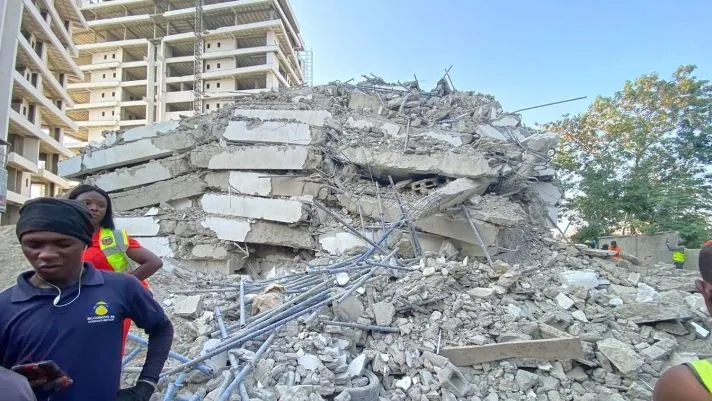By Maduka Nweke, [email protected]
Stakeholders in the built environment have concluded that as the greatest culprit in the rising incidences of building collapse government’s at all levels have shown that they lack the capacity to halt the incidents across the country.
A few days after the seven storey building collapsed on Banana Island, Lagos, another building caved in though without casualty at 43, Ladipo Oluwo Street, Government Reserved Area (GRA), Apapa, Lagos, a two-storey building under construction, collapsed giving indication that all efforts put to ameliorate collapse of building in Lagos have not yielded any dividend at all.
As was reported, a bolt of lightning hit the building before it came down at about 9:00a.m.
Lagos State Materials Testing Laboratory (LSMTL) had on January 5, 2023, sealed the building, but the developer continued with the construction. But after the collapse, officials of the Lagos State Building Control Agency (LASBCA) againr sealed it up.
PropertyMart discovered that there was no signage to indicate the nature of the building being constructed, no name of the contractor, and nothing to show when the project commenced, which was against LASBCA’s building regulations.
Speaking on these building collapses coming in quick succession, a property expert who spoke to PropertyMart, Mr. Andrew Yaspam, said that due to to level of corruption in the country, everything is going the wrong way including government policies as the rule of law is no longer obeyed. According to him, protective coats given to relatives who are government contractors have made it impossible for defaulters in building collapse to be given the requisite punishment that will deter others from disobeying government rules of construction. “Governments in Nigeria are sponsored and most of the chief executives have godfather who are untouchable. Because these people are untouchable, the projects they carry out are always seen as coming from the Oga on top, “he said.
According to Dr. Meckson Okoro, Principal Partner, MI Okoro and Associates, an expert in the built environment, so much has been said about building collapse. He said, “The recurring decimal is government, government and government. It is government because to start with, if government makes law, that before you build on a particular site, you must build according to town and physical planning specification and other government agencies regulations as it affects built environments, if you are given a requisite punishment for going against that rules, others will learn.
“But in this case, the government don’t seem to have enough staff to even check at the physical planning level and then, those who try to skip in to see, when they are given some understanding, they look the other side and the developer who is more interested in making money may be given approval for five storey building but you see him doing 10 storey building on the same foundation.
“Because the government official is already been compromised, he cannot question the developer. He will then go ahead with development and after sometime you will hear that the building has collapsed, at times even killing the developer himself. I think everything starts and ends with the government. By the time the government begins to moderate themselves, begins to punish themselves, begins to track down all those corrupt officials and punish them or send them outside the system and making sure that the right thing is done, that is when building collapse will stop,” he concluded.
In the words of for National President, Nigeria Institute of Builders (NIOB), Chief Kunle Awobodu, a lot of factors have been identified as causes of building collapse in the country. He said that lack of proper subsoil investigation, faulty design and copied design which the user does not have authority over, non-adherence to approved design and poor workmanship are some of the things that result in building collapse.
Awobodu went further to say that use of substandard materials, use of quacks and inadequate supervision result in building collapse. “Non-adherence to professional advice, inadequate drainage, change in use, professional incompetence and negligence, ignorance and constructing in crisis situation. Others, unrealistic construction timelines, cognitive dissonance. human greed, fire incident, lack of maintenance and force majeure/ natural disaster,” he said.

